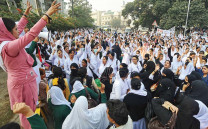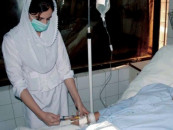Local government: The reality check that must not bounce
The prism through which the Sindh Local Government Ordinance 2012 should be viewed.

For my part, I admit I also felt a sense of trepidation and had kept my expectations low. This is because I feared it would resemble the Punjab Local Government Act 2012. After having examined the Sindh ordinance, I’m happy to say that I was pleasantly surprised. Indeed, it seems that the delay in introducing SPLGO 2012 has actually benefitted Sindh and has led to a more mature plan. While it is not without its demerits, it does create a more sound foundation on which to build a local system that is a better match for changing ground realities.
This is important because a local government system that doesn’t match/respect changing demographics and/or is unbalanced has economic consequences. Certain kinds of local systems advance economies while others undermine them.
It is in this context that any local government plan must be examined.
As the national government announces a plan for Special Economic Zones (SEZs), it is well worth keeping in mind that the country that used SEZs most productively (China) also relied even more heavily on its local governments as economic engines. Hence, from the villages (with amazingly successful rural industrialization under the township and village enterprises) to the urban centers, each sector was empowered to be economically active. The Chinese understand the value of decentralization, clustering, agglomeration economies and integrated regional governance. It is a lesson that Pakistan still needs to learn.
Developing countries like Pakistan have been disadvantaged by the fact that they face rapidly changing demographics and settlement patterns, which their local systems have been unable to manage as they were devised for a different time. The sensibility that developed countries have about the need to upgrade and improve local systems is not realised and/or appreciated in such countries.
Hence they have not evolved their systems as developed countries have. It is not just limited resources that are to be blamed, but also the structure of their systems and the unwillingness of their governments to face changing realities. Here, the reality is that Pakistan is now the most urbanised country in South Asia and has developed distinct settlement patterns.
As revealed by the 1998 census, 50% of the population lived in cities with a population exceeding a million residents. In Sindh, Karachi has over 60% of the urban population.
This indicates unbalanced urban development and an over reliance on Karachi. At the same time Karachi is the urban economic engine of the country and its economic health has a nationwide effect.
Meanwhile, rural poverty in the province is based primarily in its nonfarm sector. Pakistan thus needs a local system that nurtures its latent productive capacity. As a result the local government plan has a tall order to fill. The Sindh Local Government Ordinance 2012 takes some concrete steps in the right direction. In doing so it has combined aspects of both the Sindh Local Government Act 2001, which took the first steps towards addressing its urbanising reality, with some aspects of an older system which was devised for a different time.
It was not in any way a step towards building on the platform of Sindh Local Government Act 2001 in a more evolutionary direction. Like the Punjab law, SPLGO 2012 elevates the role of the province to constrict or stifle the autonomy and takes away the incentive for self improvement within local governments.
So whereas it was not a step in as regressive a direction as undertaken in the Punjab, it was more conservative than it needed to be.
Mayraj Fahim, as a Senior Fellow of the City Mayors Foundation, writes about local government on its website with an international perspective. She can be followed on twitter @MayrajFahim
Published in The Express Tribune, October 4th, 2012.


















COMMENTS
Comments are moderated and generally will be posted if they are on-topic and not abusive.
For more information, please see our Comments FAQ